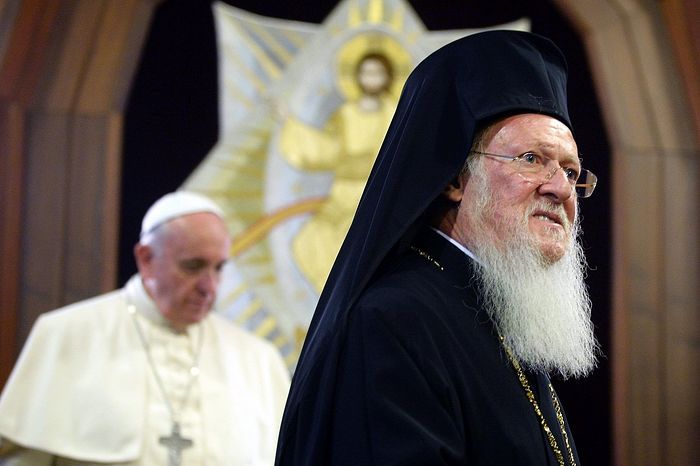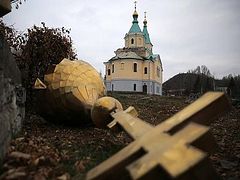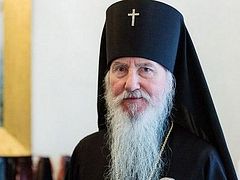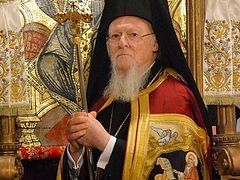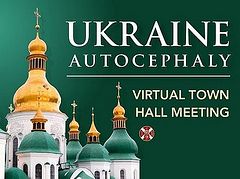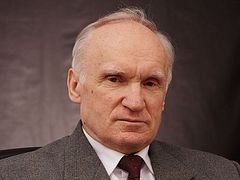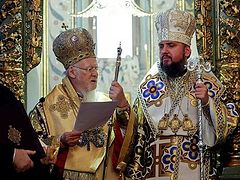Istanbul, March 4, 2019
As OrthoChristian has reported several times already, Patriarch Bartholomew of Constantinople explicitly rejected His Beatitude Patriarch John X of Antioch’s late-December call for a pan-Orthodox council to resolve the ongoing Ukrainian crisis (see here, here, and here).
On December 24, Pat. Bartholomew wrote to the autocephalous Local Churches, asking them to acknowledge the results of December 15’s “unification council” that created a new, nationalist church in Ukraine. In response, Pat. John implored the primate of Constantinople to convene a Synaxis of the Primates to address the issue.
The full text of Pat. Bartholomew’s reply to Pat. John’s reply has since been published in Russian on the official site of the Russian Orthodox Church, and in English on Orthodox Synaxis, revealing Pat. Bartholomew’s reasons for rejecting the call to deal with the Ukrainian issue synodically.
As has long been suspected, Constantinople’s decision to act unilaterally in Ukraine is in direct response to the failure of 2016’s “Holy and Great Council” on Crete, which the Antiochian, Bulgarian, Georgian, and Russian Churches did not attend. His Eminence Metropolitan Kallistos (Ware), a hierarch of the Patriarchate of Constantinople, stated in a December interview that he does not have any insider information as to why Pat. Bartholomew has chosen now to intervene in Ukraine, but in that context he did note that the Patriarch must have been very disappointed that the Russian Church did not attend the Crete council.
In a September interview, His Eminence Metropolitan Hilarion (Alfeyev) spoke about how Pat. Bartholomew was very offended that the four Churches did not attend Crete, and that he told him personally that he believed the Russian Church had plotted with the Antiochian, Bulgarian, and Georgian Churches to not attend the council.
In the Archons of the Ecumenical Patriarchate’s recent town hall meeting on Ukrainian autocephaly, Metropolitan Emmanuel of Gaul of the Ecumenical Patriarchate also says that it is strange for the Russian Church to seek a pan-Orthodox resolution to the Ukrainian issue when they did not attend Crete.
And noting that he had received Pat. John’s letter from December 31, Pat. Bartholomew responds:
We inform you that after four Orthodox churches, without reason from an ecclesiological and theological point of view, refused to be present during the work of the Great and Holy Council, for which there is no excuse– and your ancient church was one of them– the Ecumenical Patriarchate has good reason to refrain from such a meeting at the Pan-Orthodox level, which would be useless inasmuch as it would only lead to agreement that the participants are in disagreement with each other.
Pat. Bartholomew’s reasoning confirms what was previously written in “Comments on the Archons’ Town Hall Meeting on Ukrainian Autocephaly,” that Constantinople’s position strongly implies that it believes that the Churches that did not attend Crete effectively gave up on synodality altogether, and have no more right to call for a pan-Orthodox gathering. Pat. Bartholomew’s response to Pat. John seems to kill the possibility for any future pan-Orthodox council.
Further, it is incorrect to say that the four Churches did not attend “without reason from an ecclesiological and theological point of view,” given that the Antiochian Church in particular did not attend precisely due to its ecclesiological break in communion with the Jerusalem Patriarchate. Numerous appeals have been made to Constantinople to help heal this schism, but Pat. Bartholomew decided to postpone the issue until after Crete (and the issue has still not been resolved, 2.5 years after Crete).
The Holy Synod of the Patriarchate of Antioch responded:
The Holy and Great Orthodox Council cannot take place while the communion between two Apostolic churches is broken, given the Eucharistic character of this Council. Issuing this decision before the convening of the Council leaves the Antiochian Church the one and only unacceptable choice of participating in the Great Council without concelebrating at the Eucharist because of not finding a solution to the ongoing violation committed by the Patriarchate of Jerusalem for more than three years.
…If the Council convenes whilst two Apostolic Churches are not in communion with each other, this means that participation in the synodical sessions is possible without taking part in the Holy Eucharist, which deprives the Council of its ecclesiological character and grants it an administrative quality, contradictory to the steadfast Orthodox synodical tradition.
It is also notable that the Patriarch writes that a pan-Orthodox gathering would be “useless,” given his traditionally-understood role as coordinator and consensus-builder between the Churches.
Pat. Bartholomew also writes that the Patriarchate of Constantinople acted in Ukraine only in a spirit of “love and self-sacrifice, without self-interest of pressure, with the sole aim of the unity of the Ukrainian people” and of ending the schism of millions of believers, “after they had been unjustly outside” of the canonical Church.
Though the Patriarch does not explain his reasoning here, given that the parishioners of the schismatic “Kiev Patriarchate” and the schismatic “Ukrainian Autocephalous Orthodox Church” were willing members of those bodies, he seems to imply that freely entering into schism ought not to place one outside the canonically-recognized body—such a view would be “unjust.”
Moreover, Pat. Bartholomew accepted the Russian Church’s excommunication in 1992 and anathematization in 1997 of Philaret Denisenko, the former canonical Metropoiltan of Kiev, for entering into and continuing in schism. Further, he explicitly acknowledged that the Russian Church held “exclusive competence” to deal with this matter.
Thus, in referring to the schismatics’ existence as schismatics as “unjust,” Pat. Bartholomew repudiates his own previous decisions.
Calls for a pan-Orthodox solution to the Ukrainian crisis have come from every Local Orthodox Church, whether by Synod, primate, or hierarchs, but Pat. Bartholomew continues to plot his unilateral course.
Follow us on Facebook!

